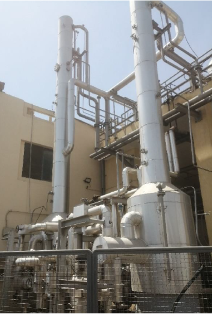Roto House saves $2.3 million annually by recovering wasted solvent

Investor
Roto House for Printing

Location
6th of October City, Egypt

Investment
GHG Reduction through Solvent Recovery System

Investment Size
$2.52 million

Financial results
$2,311,131 annual cost savings, $252,465 sub-loan incentive of 10% IRR 103%

CO2 savings
10 ktCO2eq/year

Impact
Climate change mitigation

Donor
EBRD

The project resulted in the creation of 12 permeant jobs including one female.
Roto House for Printing is as a leading company in the printing and packaging materials sector across Egypt and the Middle East. The company is specialized in Rotogravure and Flexogravure printing for a wide array of high-quality and safe packaging materials that caters to the need of various industries such as snack foods, biscuits, confectionary among others.
Roto House applied for a loan through the GEFF Egypt program to install a Solvent Recovery unit aimed at capturing and reusing wasted solvent to reduce material consumption and minimize environmental hazard. The new solvent recovery unit allowed Roto House to recover wasted Ethyl Acetate solvent used in the printing process, thereby reducing operational costs and environmental emissions.
With 2 rotogravure printing presses in operation, Roto House consumed a significant amount of Ethyl Acetate solvent in the printing process. When the company was looking to expand its operation to meet market demand, it was necessary to consider solutions such as the solvent recovery technology to reduce cost while improving its carbon footprint.
Roto House received a a GEFF loan of $2.52 million, which was also eligible for a 10% incentive or $252,465 since the project’s GHG emissions reduction exceeded 20%.
The project allowed Roto House to recover about 74% of their past solvent consumption, which amounted to approximately 1,120 tonnes of Ethyl Acetate solvent annually. This translated to annual cost savings of $2.31 million and a reduction of 10,000 tonnes of in carbon dioxide emission.
Additionally, the project led to the creation of new job opportunities, improved workplace health and safety, thus supporting the company’s commitment to responsible business practices and employee well-being.
In addition to receiving GEFF financing and financial incentives, Roto House also received technical support from the GEFF project consulting team that helped them evaluate and asses the technical and financial feasibility of the the project as well as ensuring its eligibility for the program.
GEFF Egypt was developed by the European Bank for Reconstruction and Development (EBRD) and is supported by the European Union Neighbourhood Investment Facility



